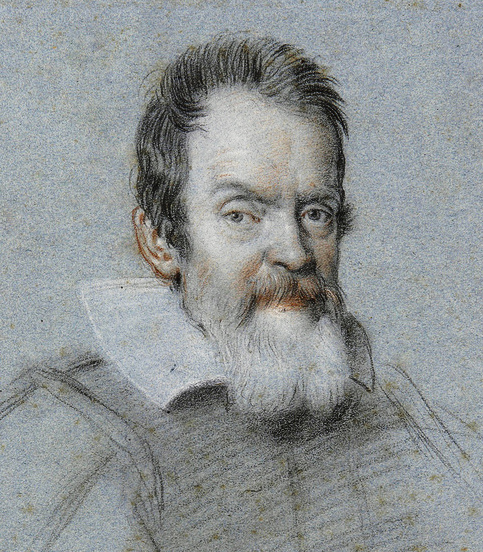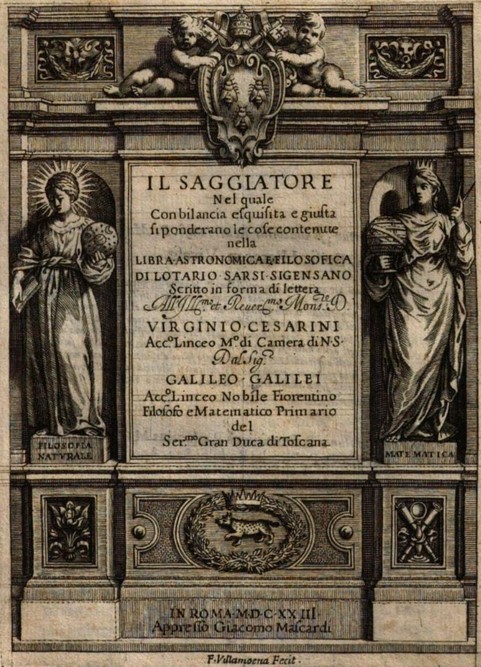- About MAA
- Membership
- MAA Publications
- Periodicals
- Blogs
- MAA Book Series
- MAA Press (an imprint of the AMS)
- MAA Notes
- MAA Reviews
- Mathematical Communication
- Information for Libraries
- Author Resources
- Advertise with MAA
- Meetings
- Competitions
- Programs
- Communities
- MAA Sections
- SIGMAA
- MAA Connect
- Students
- MAA Awards
- Awards Booklets
- Writing Awards
- Teaching Awards
- Service Awards
- Research Awards
- Lecture Awards
- Putnam Competition Individual and Team Winners
- D. E. Shaw Group AMC 8 Awards & Certificates
- Maryam Mirzakhani AMC 10 A Awards & Certificates
- Two Sigma AMC 10 B Awards & Certificates
- Jane Street AMC 12 A Awards & Certificates
- Akamai AMC 12 B Awards & Certificates
- High School Teachers
- News
You are here
Quotations in Context: Galileo – 2
“Mathematics is the language with which God has written the universe.”
Unlike the previous column, in which I argued a quotation may be misattributed to Galileo Galilei, the sentence above unquestionably does have its original source in his works. However, even considering the changes necessary when translating from Italian to English, it would be more accurate to describe it as a paraphrase rather than as an actual quotation of Galileo. The “quotation" has appeared (with slightly varied wordings) in numerous publications over the last fifty years, and the oldest example I’ve found is at the conclusion of the 1959 classic Disney short animated film Donald in Mathmagic Land, where it is stated as “Mathematics is the alphabet with which God has written the universe” [Clark 1959].

Drawing of Galileo by Ottavio Leoni, 1624. Public domain, Wikimedia Commons.
The original source material is from Galileo’s Il Saggiatore (The Assayer), published in 1623, which was written in response to the work Libra astronomica ac philosophica, published in 1619 by the Jesuit scholar Orazio Grassi under the pseudonym “Lothario Sarsio Sigensano.” Galileo addressed his remarks directly to “Sarsi," even though he stated early in Il Saggiatore that he knew full well that this was not the author’s true name. The material related to the subject of this column appeared when Galileo attacked the author’s adherence to the theories and work of Tycho Brahe.

Title page of Il Saggiatore, 1623. Public domain, Google Books.
Below is the original Italian text from Il Saggiatore, followed by an English translation of the passage from Discoveries and Opinions of Galileo by Stillman Drake, published in 1957:
Parmi oltre à ciò di scorgere nel Sarsi ferma credenza, che nel filosofare sia necessario appoggiarsi all’opinioni di qualche celbre Autore, si che la mente nostra, quando non si maritasse col discorso d’vn’altro, ne dovesse in tutto rimanere sterile, ed infeconda; e sorse stima, che la Filosofia sia un libro, e une fantasia d’un uomo, come l’Iliade, e l’Orlando furioso, libri ne quali la meno importante cosa è, che quello che vi è scritto, sia vero. S. Sarsi la cosa non istà così. La Filosofia è scritta in questo grandissimo libro, che continuamente ci stà aperto innanzi à gli occhi (io dico l’universo) ma non si può intendere se prima non s’impara à intender la lingua, e conoscere i caratteri nei quali è scritto. Egli è scritto in lingua matematica, e i caratteri son triangoli, cerchi, & altre figure Geometriche, senza i quali mezi è impossibile à intenderne umanamente parola; senza questi è un aggirarsi vanamente per un’oscuro laberinto [Galileo 1623, pp. 24–25].
In Sarsi I seem to discern the firm belief that in philosophizing one must support oneself upon the opinion of some celebrated author, as if our minds ought to remain completely sterile and barren unless wedded to the reasoning of some other person. Possibly he thinks that philosophy is a book of fiction by some writer, like the Iliad or Orlando Furioso, productions in which the least important thing is whether what is written there is true. Well, Sarsi, that is not how matters stand. Philosophy is written in this grand book, the universe, which stands continually open to our gaze. But the book cannot be understood unless one first learns to comprehend the language and read the letters in which it is composed. It is written in the language of mathematics, and its characters are triangles, circles, and other geometric figures without which it is humanly impossible to understand a single word of it; without these, one wanders about in a dark labyrinth [Galileo 1957, pp. 237–238].
References
Clark, Les, Hamilton Luske, Joshua Meador and Wolfgang Reitherman, directors. 1959. Donald in Mathmagic Land. Walt Disney Animation Studios.
Galileo. 1623. Il Saggiatore. Rome: Giacomo Mascardi.
Galileo. 1957. Discoveries and Opinions of Galileo. Translated by Stillman Drake. New York: Doubleday Anchor Books.
“Quotations in Context” is a regular column written by Michael Molinsky that has appeared in the CSHPM/SCHPM Bulletin of the Canadian Society for History and Philosophy of Mathematics since 2006 (this installment was first published in May 2014). In the modern world, quotations by mathematicians or about mathematics frequently appear in works written for a general audience, but often these quotations are provided without listing a primary source or providing any information about the surrounding context in which the quotation appeared. These columns provide interesting information on selected statements related to mathematics, but more importantly, the columns highlight the fact that students today can do the same legwork, using online databases of original sources to track down and examine quotations in their original context.
Michael Molinsky (University of Maine at Farmington), "Quotations in Context: Galileo – 2," Convergence (December 2023)




